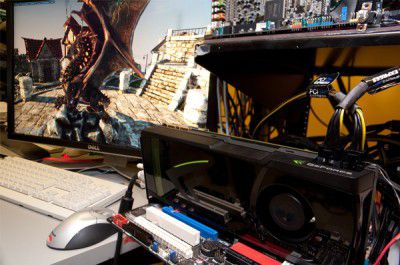- Qualcomm Launches Snapdragon 4 Gen 2 Mobile Platform
- AMD Launches Ryzen PRO 7000 Series Mobile & Desktop Platform
- Intel Launches Sleek Single-Slot Arc Pro A60 Workstation Graphics Card
- NVIDIA Announces Latest Ada Lovelace Additions: GeForce RTX 4060 Ti & RTX 4060
- Maxon Redshift With AMD Radeon GPU Rendering Support Now Available
NVIDIA’s Fermi Launch Delayed Until March
This news can be filed under “rumor”, because nothing is verified, but the word that’s spreading like wildfire is that NVIDIA’s first Fermi-based graphics cards are going to be delayed until March. As you may recall, Fermi was originally supposed to launch late this year, but was rumored to have been pushed back until January. As it stands, it’s being pushed back even further, which I’m sure makes ATI all the happier.
Interestingly enough, Fermi shared similar goals as Intel’s Larrabee, a chip that was also delayed just earlier this month. Could Fermi’s delay be related? It’s hard to say, because if that were the case, then it would mean that NVIDIA was more interested in simply getting something out the door, rather than have a truly revolutionary product.
More likely would be other causes, that could range from efficiency issues to problems with producing the die on a 40nm node. You may recall that this past fall, NVIDIA showed off a Fermi card that was touted as being the real thing, but was actually a mock-up, which led everyone to believe that there were issues somewhere. But just last month, the company teased with an image of a Fermi-based card running Unigine’s DirectX 11 demo, although even that couldn’t be verified as true since it’s just a photo.
The one thing that’s certain is that the major beneficiary of this delay is AMD, whose ATI cards are still market-leading in terms of performance, and by a rather sizable margin, even when pricing is taken into consideration. With Fermi’s launched pushed to March, it means AMD has two more months to soak up the success, and now that his HD 5800 series cards are starting to finally see ample supply, it’ll definitely be reaping the rewards in the months to come.

A multi-quarter delay in the launch of a flagship product is always bad news under any circumstances, but this development strikes NVIDIA at a particularly awkward time. Earlier this year, the company bowed to the inevitable and halted development of its chipsets for non-Atom x86 platforms. This move was due in part to lack of a DMI bus license, and in part to the fact that the GPU’s impending move onto the CPU die means that integrated graphics processors are a losing battle in the long-term if you aren’t also in the x86 CPU business.
| Source: Ars Technica |
Discuss: Comment Thread
|




